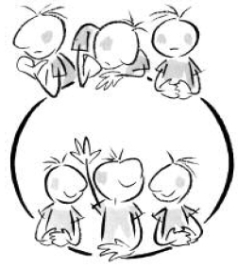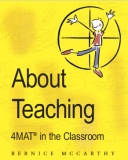About Teaching Excerpt: Broadening the view of Student Intelligence
We now know that Piaget’s formal reasoning is only one aspect of intelligence.
The processing of learning into active behavior with hands-on and adapting mechanisms must take an equal place in the current definition of intelligence. Hands-on learning can no longer be regarded as lesser talent.
Yet the schooling definition of thinking remains quite narrow. It is limited to the 6 o’clock things, the reasoning and analysis things. And somehow that need, to teach the 6 o’clock kind of thinking, has become the only kind of thinking to teach. We ask our students to stay often in the receiving mode, studying facts and analyzing, examining what the experts have done. While this is a part of all learning, it is just not enough.
 With formal thinking as the highest level, the best thinkers are the abstract thinkers, and direct experience takes a back seat. Using these stages, we view children through the narrow bias of logical ability, neglecting to take into account the whole range of knowing that human experience is.
With formal thinking as the highest level, the best thinkers are the abstract thinkers, and direct experience takes a back seat. Using these stages, we view children through the narrow bias of logical ability, neglecting to take into account the whole range of knowing that human experience is.
We start with the concrete and we move to the abstract. But it is not just the ability to be abstract that we are after. Learning is active doing. Learning is problem solving, creating hypotheses, tinkering with them, drawing conclusions, and much more.
In Piaget’s conception, we have a vivid description of the functions of the left cerebral hemisphere. The whole brain needs to be engaged. There is no hierarchy on the cycle. All parts of the cycle are equally necessary and equally intelligent. Together they comprise the wholeness of how we learn. It is not better or smarter to be at 6 o’clock. It is simply a part of the cycle.
We need to return to direct experience by using what we learn. The cycle represents how each of us learns at whatever developmental stage. The cycle describes how we move from direct experience to expert knowledge, through reflection to action, and then to integration.
Learn more about the 4MAT Teaching method in the About Teaching book!
Sign up for About Learning Newsletter
Receive tips and research on maximizing the impact of learning in the About Learning Newsletter. Sign Up Today!



You must be logged in to post a comment.